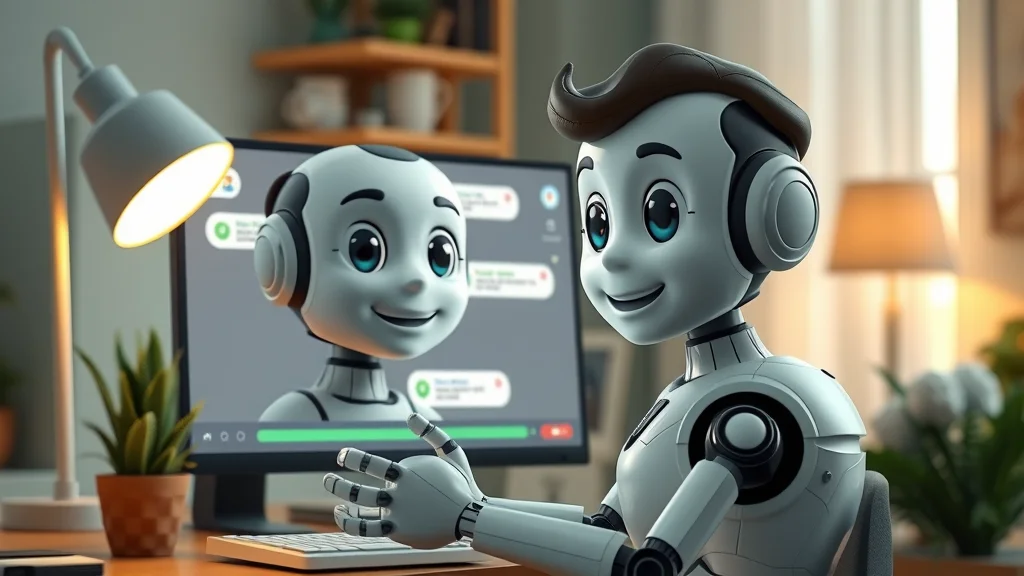Did you know over 80% of customers now expect instant responses from businesses online—day or night? As brands scramble to meet rising expectations, ChatGPT customer engagement stands out as a game-changer, equipping even small and local businesses with AI tools once reserved for enterprise giants. This comprehensive guide unlocks the secrets behind maximizing loyalty and satisfaction using AI chatbots like ChatGPT. Whether you’re new to customer engagement or eager to transform your approach, you’ll discover research-driven insights, real-world strategies, and actionable steps that will move your business ahead of the curve.
Unlocking the Power of ChatGPT Customer Engagement: Why it Matters
In today’s hyper-connected marketplace, customer engagement has never been more critical for small businesses. With consumers interacting across social media, online chat, and traditional channels, brands need to rise above the noise and deliver fast, reliable support. This is where chatgpt customer engagement comes into play, bridging the gap between personalized, real-time responses and scalable customer service solutions.
An ai chatbot like ChatGPT can act as a dedicated first responder—offering immediate, around-the-clock assistance for general queries, troubleshooting, booking appointments, or even providing personalized recommendations. Unlike a traditional customer service agent limited by shift and capacity, ChatGPT operates continuously. This not only improves customer experience and increases satisfaction but also allows your human agents to focus on solving more complex issues. The result? Happier customers, a stronger customer relationship, and a significant boost in customer loyalty.

- The fundamentals of chatgpt customer engagement
- Actionable steps for maximizing customer engagement with ChatGPT
- How to integrate AI chatbot tools for superior customer service
- Tips for creating loyalty through excellent chatgpt customer engagement
ChatGPT Customer Engagement: Surprising Statistics and Trends
The numbers speak for themselves when it comes to ai in customer service. According to recent research, over 65% of consumers prefer digital channels like chatbots for simple inquiries—reinforcing the growing demand for seamless, instant support. Businesses already capitalizing on AI-driven engagement report a 35% increase in customer satisfaction, a statistic underlining the transformative effect of AI tools like ChatGPT.
Furthermore, chatbots now handle up to 70% of basic customer queries, freeing human agents to focus on intricate pain points and complex service requests. Over 60% of small businesses that adopted AI chatbot support saw measurable improvements in both customer loyalty and cost-efficiency. ChatGPT’s ability to integrate with existing channels, from web chat to social media, means every interaction becomes an opportunity to maximize customer engagement and build lasting relationships.

“Businesses that implement AI in customer service see a 35% increase in customer satisfaction.”
As you explore the benefits of AI-driven engagement, it's worth noting how innovative business strategies—such as securing significant funding or leveraging new technologies—can further empower local enterprises. For example, the story of Burton House securing a $55 million refinance loan in Beverly Hills highlights how resourceful approaches can provide the foundation for adopting advanced solutions like ChatGPT, ultimately driving both growth and customer satisfaction.
Understanding ChatGPT Customer Engagement and Its Importance
What Is ChatGPT Customer Engagement?
At its core, chatgpt customer engagement means leveraging OpenAI’s advanced language model as an ai chatbot to create conversations that drive value for both customers and businesses. Unlike generic bots, ChatGPT understands context and intent, responding in natural language that feels personalized. This evolution enables businesses to move from static FAQ pages to dynamic, real-time support, catering to a wide array of customer experiences.
By deploying ChatGPT for customer engagement, businesses can instantly address customer queries, reduce friction, and gather valuable customer data that informs future outreach. The result is more meaningful customer interactions—every chat becomes a chance to build trust and solidify loyalty. Whether it’s solving a pain point or recommending a new product, AI chatbots set a new standard for responsiveness and personalization in customer service.

The Evolution of AI Chatbot Technology in Customer Service
The journey of ai in customer service has come a long way from scripted chatbots to the adaptable conversational intelligence of ChatGPT. Early bots could only answer basic, limited commands—often leaving customers frustrated and switching back to human agents. Today, modern AI chatbots rely on deep learning and contextual awareness, allowing them to interpret, adapt, and learn from every customer interaction.
ChatGPT’s conversational capacity adds an empathetic touch to automation, understanding not just words but the intention behind them. It bridges the gap between efficient automation and the warmth expected from a customer service agent. By consistently evolving and integrating new features, AI chatbots are poised to become the backbone of modern customer support, eliminating bottlenecks and enhancing satisfaction at every step of the journey.
How AI in Customer Service Transforms Customer Support
With technologies like ChatGPT, businesses now have the ability to deliver consistent, high-quality support regardless of scale. AI chatbots not only handle routine customer queries but can also escalate more complex issues to human agents, ensuring that no interaction is left unresolved. This seamless collaboration between AI technology and human empathy transforms the notion of customer experience.
The integration of AI in customer service has proven to reduce response times by up to 80%, improve customer retention, and allow proactive engagement—like follow-ups and personalized suggestions based on customer data. These advances set businesses up to maximize customer engagement, turning service interactions into memorable experiences that keep users coming back.
Core Benefits of ChatGPT for Customer Engagement
24/7 Customer Support and Faster Response Times
The top benefit of integrating ChatGPT into your customer support workflow is its 24/7 availability. Unlike human agents whose capacity is limited by office hours and workload, ChatGPT can provide timely assistance at any time of day. This ensures that no customer query is left unattended, reducing frustration and increasing trust in your brand.
Fast, responsive service is a key driver in modern customer engagement. By automating routine answers and common requests, ChatGPT allows human service agents to prioritize complex issues, leading to quicker overall response times and higher customer satisfaction. Customers today expect instant solutions, and an AI chatbot empowers small businesses to deliver exactly that—cementing loyalty and standing out from competitors.

Personalization and Customization in Customer Interactions
One powerful feature of chatgpt for customer engagement is its ability to offer personalization. By analyzing customer data from previous purchases, browsing history, or behavior patterns, ChatGPT can tailor responses to each user—offering relevant product recommendations, targeted promotions, or even addressing customers by name for a personal touch.
This level of customization builds authentic connections, making customers feel valued rather than like just another ticket in the queue. Small businesses, in particular, can leverage this capability to replicate the personal touch typically found in face-to-face interactions, now translated into digital conversations. The result: deeper customer loyalty and increased business through repeat purchases and word-of-mouth referrals.
Maximize Customer Loyalty with Consistent Engagement
Consistency is key to building any successful customer relationship. With ChatGPT, your business can maintain high standards in customer interaction, regardless of day, time, or staff changes. Every customer receives a reliable, on-brand experience that reinforces trust and credibility.
AI-driven engagement also enables routine check-ins, proactive outreach, and surveys—creating two-way dialogue. This not only helps in gathering essential customer feedback but also signals that your brand genuinely cares, fostering a community around your business. Over time, consistency and responsiveness transform one-off buyers into loyal advocates.
How to Maximize Customer Engagement with ChatGPT
ChatGPT for Customer Service: Key Use Cases
Small businesses can unleash the true value of chatgpt for customer service by deploying it across multiple touchpoints. Key applications include answering FAQs, order tracking, booking, handling complaints, automated scheduling, offering recommendations, and providing after-sales support. ChatGPT’s flexibility empowers businesses to adopt a hybrid approach: automating routine requests while routing complex questions to skilled human agents.
A proactive ai chatbot is also indispensable across social media platforms, responding to messages and comments in real-time. This ensures your brand maintains a consistent voice while replying faster than your competitors. From onboarding new customers to troubleshooting and follow-up, ChatGPT can transform every stage of the customer journey.
ChatGPT for Customer Support: Handling Common Issues
Repetitive pain points, such as account access issues, shipping inquiries, or product returns, no longer drain valuable staff time. ChatGPT for customer support handles these scenarios seamlessly, providing step-by-step guidance and clear solutions. The ai chatbot can also collect relevant information to further personalize the support process or inform your human team of the context when escalation is needed.
This division of duties means customers spend less time waiting and more time resolving their problems, reinforcing positive sentiment with your brand. Over time, handling common issues efficiently not only improves customer satisfaction but also helps maximize retention and referrals.
Integrating ChatGPT into Your Customer Service Workflow
Integrating chatgpt into your customer service workflow is easier than ever, thanks to flexible APIs and plugins for websites, e-commerce stores, and social media accounts. Start by mapping the customer journey to identify the best touchpoints for automated engagement: website chat, Facebook Messenger, email autoresponders, or support ticket systems.
Work closely with your IT team (or platform provider) to set up custom triggers, intents, and escalation rules. Always test the system thoroughly to ensure a seamless transition between the ai chatbot and human agents. Regular integration reviews and updates keep your workflow running smoothly and maximize your customer engagement ROI.

- Create a map of your customer journey
- Identify repetitive and time-sensitive touchpoints for chatbot automation
- Integrate ChatGPT via APIs or plugins into your website and key digital channels
- Train your human agents to collaborate with ChatGPT on escalated issues
- Regularly review interactions, collect feedback, and update chatbot responses
Best Practices to Maximize Customer Engagement with ChatGPT
Training ChatGPT for Better Customer Interactions
AI chatbots are only as good as their training. To maximize customer engagement, regularly update ChatGPT’s knowledge base with your latest policies, products, and FAQs. Utilize real conversational data, feedback, and common pain points to fine-tune responses. Include sample scenarios for sales, technical support, and customer relationship management to create a comprehensive, empathetic AI assistant.
Encourage your team to spot and flag unhelpful answers or gaps in chatbot knowledge. Regular training sessions, leveraging input from customer service agents, help align AI tone, accuracy, and escalation logic for improved customer interactions. Consider periodic “mystery shopper” tests with ChatGPT to maintain quality control.

Answering FAQs Efficiently with ChatGPT
A standout benefit of ChatGPT for customer engagement is its ability to handle answering FAQs quickly and accurately. Design your AI chatbot to address the most common customer queries with up-to-date, detailed answers. This not only saves time for both customers and your staff but also ensures consistency in information delivery.
Make use of ChatGPT’s natural language processing to interpret the intent behind questions—even when phrased in non-standard ways. Monitor chatbot analytics to identify gaps or emerging questions and update response libraries proactively. Efficient FAQ management helps reduce response times and positions your brand as reliable and forward-thinking.
Utilizing Feedback to Refine AI Chatbot Performance
Every conversation is an opportunity for improvement. Encourage customers to leave feedback after each interaction with ChatGPT. Analyze this data to identify strengths and areas for improvement. Use customer reviews and pain points to train your chatbot further, ensuring it evolves alongside customer expectations.
Don’t ignore negative feedback; instead, treat it as a guide to refine scripts, add new scenarios, or improve escalation protocols. By closing the feedback loop, you’ll steadily enhance both your customer engagement and your overall service delivery, transforming minor complaints into major loyalty drivers.

| Feature | ChatGPT Customer Engagement | Traditional Customer Service |
|---|---|---|
| Availability | 24/7 automated support | Limited by staff hours |
| Response Times | Instant answers for most queries | Delayed, especially after hours |
| Personalization | AI-powered, data-driven interactions | Varies by agent and channel |
| Scalability | Handles unlimited queries simultaneously | Limited by staff capacity |
| Consistency | Always on-brand and up-to-date | Subject to human error |
| Cost | Lower operating costs at scale | Rising labor costs |
Strategies to Build Loyalty Through Superior ChatGPT Customer Engagement
Proactive Support and Predictive AI in Customer Service
Superior chatgpt customer engagement means reaching out before your customers feel the need to start a conversation. Predictive AI tools allow ChatGPT to recognize patterns in customer data—like repeat product searches, negative feedback, or unresolved issues—and trigger timely follow-ups or solutions. This proactive approach demonstrates care and foresight, turning occasional buyers into devoted fans.
Use predictive analytics to foresee potential service issues, recommend maintenance, or suggest complementary products. Being one step ahead greatly enhances the customer experience and solidifies your reputation as a proactive, service-first brand.

Leveraging Customer Data for Personalized Experiences
Personalization is more than just using a customer’s name. By effectively leveraging customer data from purchase history, chat interactions, or even social media behavior, ChatGPT can create experiences tailored to each individual’s needs and preferences. This may include tailored solutions to pain points, priority support, or preview access to coming promotions.
Data-driven personalization not only increases customer satisfaction but also helps businesses upsell, cross-sell, and drive stronger engagement by making every customer feel like a VIP. Remember: the more relevant the guidance, the stronger the bond and the higher the lifetime value.
Encouraging Customer Feedback and Two-way Interactions
Great customer engagement is a dialogue—not a monologue. Encourage ongoing two-way communication by making it easy for customers to offer feedback and suggestions after interacting with ChatGPT. Use surveys, follow-ups, or interactive prompts to gather insights.
This open approach not only helps improve your AI chatbot but also empowers customers, giving them an active role in shaping your products and services. Over time, this collaboration fosters a loyal community, helping small businesses retain and grow their customer base in competitive markets.
Case Studies of Successful AI Chatbot Implementations
Companies of all sizes—from local retailers to national service brands—have unlocked measurable results by implementing ChatGPT-driven solutions. One regional bakery saw a 40% reduction in customer queries to their support inbox by automating order tracking and FAQ responses with ChatGPT. An independent repair shop boosted customer satisfaction by offering 24/7 appointment scheduling and sending proactive reminders through chatbot outreach.
These examples prove that no matter your industry or business size, integrating chatgpt for customer engagement can drive efficiency, satisfaction, and loyalty, all while keeping costs in check.
People Also Ask: How can ChatGPT help with customer service?
ChatGPT can help with customer service by instantly answering queries, providing personalized recommendations, and automating repetitive tasks. Its AI chatbot capabilities ensure customer engagement is seamless and efficient.
People Also Ask: What are the four P's of customer engagement?
The four P's of customer engagement typically include Product, Process, People, and Personalization. With chatgpt customer engagement, businesses can enhance each area for better results.
People Also Ask: What are the 6 key elements of customer engagement?
Six key elements are active listening, personalized interactions, consistency, responsiveness, creating value, and building trust—all achievable via chatgpt customer engagement.
People Also Ask: How to ask ChatGPT to create a marketing plan?
You can prompt ChatGPT to create a marketing plan by providing details about your business, target audience, and goals. The AI chatbot will generate actionable strategies to maximize customer engagement.
Key Takeaways for Maximizing ChatGPT Customer Engagement
- Leverage ChatGPT’s 24/7 support to provide instant, reliable answers
- Train your AI chatbot regularly for accurate and empathetic customer interactions
- Integrate ChatGPT into your workflow across web, social media, and email
- Collect and implement customer feedback to improve service and loyalty
- Use automation for FAQs and repetitive tasks to free up human agents
- Personalize every touchpoint using customer data for deeper engagement
FAQs About ChatGPT Customer Engagement
What industries benefit most from ChatGPT for customer service?
Virtually any industry that handles customer inquiries, appointments, or support requests can benefit from ChatGPT: retail, restaurants, healthcare, real estate, travel, and more. If your business deals with customers online or on the phone, an AI chatbot can help streamline service and maximize satisfaction.
Is data safe when using ChatGPT for customer engagement?
Most ChatGPT solutions follow strict data security and privacy standards. Always select reputable providers, review their privacy policies, and use secure integrations. Customers’ data is typically anonymized and encrypted to protect confidentiality and comply with industry regulations.
How can small businesses start using AI chatbots?
Start by identifying your most common customer queries and pain points. Choose a ChatGPT platform that integrates with your website or messaging channels. Many providers offer user-friendly templates, so you don’t need coding expertise to get started. Scale at your own pace as you see results.
Ready to Grow Your Business? Contact Us Today at 818.716.2097
Conclusion: ChatGPT customer engagement gives small businesses the tools to deliver world-class service, build loyalty, and outpace competitors in a digital-first world. Don’t wait—begin your AI transformation today!
If you’re inspired to take your customer engagement to the next level, consider how forward-thinking business moves—like strategic refinancing or investing in new technology—can set the stage for sustainable growth. Exploring stories such as Burton House’s recent financial milestone in Beverly Hills can offer valuable perspective on how robust resources and innovative thinking fuel business transformation. By combining smart financial strategies with advanced AI solutions like ChatGPT, your business can unlock new opportunities for loyalty, efficiency, and long-term success.
Sources
To further enhance your understanding of ChatGPT’s role in customer engagement, consider exploring the following resources:
-
“Enhancing Customer Engagement with ChatGPT: Tips for Businesses”: This article provides practical advice on personalizing conversations and offering instant support using ChatGPT, helping businesses create more tailored and efficient customer interactions. (ask.com)
-
“Maximizing Customer Engagement with ChatGPT: A Guide for Businesses”: This guide outlines strategies for leveraging ChatGPT to foster authentic conversations, deliver swift responses, and provide proactive assistance, all aimed at boosting customer engagement and satisfaction. (medium.com)
By delving into these resources, you’ll gain actionable insights to effectively implement ChatGPT in your customer engagement strategies, leading to improved customer relationships and loyalty.
 Add Row
Add Row  Add
Add 




Write A Comment